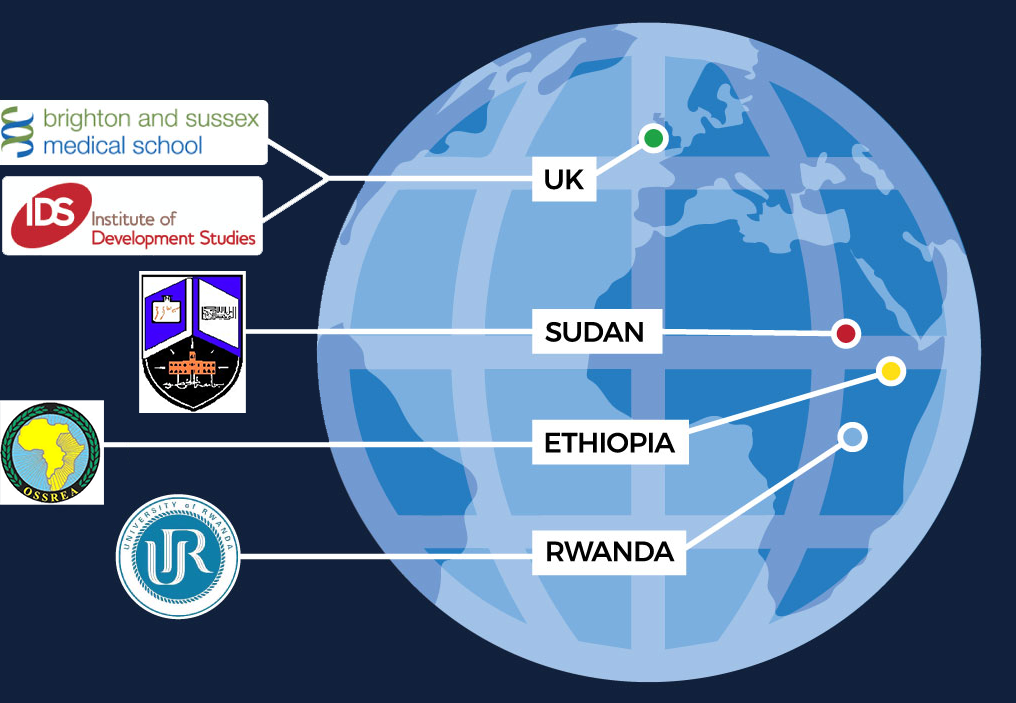Partners and collaborators

Faculty of Geographical and Environmental Sciences, University of Khartoum
The faculty of Geographical and Environmental Sciences is one of the twenty-two faculties of University of Khartoum. The establishment of the faculty shows how University of Khartoum is so concerned with and deeply recognizes the importance of geography and the environment, and the way these disciplines contribute to human knowledge, research and community service. The faculty endeavours to be a leading and distinctive faculty in the field of geographical, environmental and multidisciplinary research and adopts a holistic approach to manage complex research problems at a local, regional and global level.
Contacts:
Professor Eltaib Ganawa - ganawagis@gmail.com
Ahmed Elfaig - elfaig10@gmail.com
University of Rwanda
The University of Rwanda strives to be a leading University that develops highly enterprising graduates prepared and dedicated to building a more just and sustainable society locally, nationally and globally, with appropriate innovations that advance quality of life. Their mission is to support the development of Rwanda by discovering and advancing knowledge, committed to the highest standards of academic excellence, where students are prepared for lives of service, leadership and solutions.
BSMS’s partnership with the University is channelled through Dr. Peter Mugume, Professor in the Department of Political Sciences at the University.
more on the Rwanda Centre for Gender Studies >
Contacts:
Dr Peter Mugume - jonmugume@gmail.com
OSSREA
The Organization for Social Science Research in Eastern and Southern Africa (OSSREA) is a regional membership-based and donor-supported research and capacity-building organisation whose mission is to promote dialogue and interaction between researchers and policy-makers in Eastern and Southern Africa with a view to enhancing the impact of research on policy-making and development planning. It is based in Addis Ababa, Ethiopia. Membership is open to all individuals and institutions engaged in teaching and/or research. OSSREA not only engages in interdisciplinary research but also provides research grants to junior and senior scholars based in the region. OSSREA operates major projects either independently or in collaboration with other institutions and produces a variety of scholarly publications ranging from its bi-annual journal to monographs, books and research reports.
Read more about OSSREA >
Contacts:
Professor Getnet Tadele - getnett2001@yahoo.com
IDS
The Institute of Development Studies (IDS) is a global research and learning organisation for equitable and sustainable change. In partnership with the University of Sussex, IDS is ranked first in the world for development studies by the QS University Rankings. IDS believe passionately that cutting-edge research, knowledge and mutual learning are crucial in shaping the transformations needed to reduce inequalities, accelerate sustainability and build more inclusive and secure societies. In line with our engaged excellence approach, we are committed to collaborating closely with local civil society, governments, international NGOs, citizens, donors, researchers and many others to realise this positive change.
Contacts:
Tom Barker - Senior Health and Nutrition Convenor: t.barker@ids.ac.uk
Karine Gatellier – Nutrition Convenor: k.gatellier@ids.ac.uk